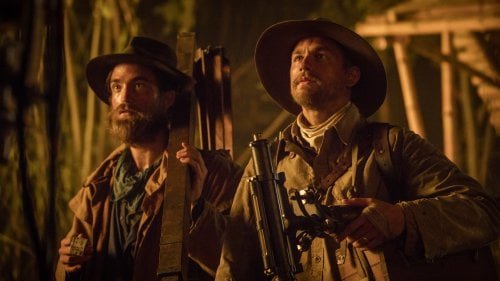The Lost City of Z

Percival Fawcett (Charlie Hunnam) was a well-decorated officer in the British army who, by the elite, was considered “unfortunate in his choice of ancestors.” But, he was a highly regarded explorer and took the daunting task, commissioned by the Royal Geographic Society, of exploring and mapping the uncharted land of Bolivia. There, he finds signs of an advanced, past civilization and becomes obsessed with discovering “The Lost City of Z.”
Laura's Review: B
In 1905 Ireland, British Major Percy Fawcett (Charlie Hunnam, TV's 'Sons of Anarchy') was frustrated by the class bigotry that kept him from rising in the ranks. He is offered a mission with the Royal Geographical Society to define the border between Bolivia and Brazil, both countries land grabbing for precious rubber resources. Hoping to distinguish himself, he left his expectant wife Nina (Sienna Miller, "American Sniper") and set off into the jungle with aide-de-camp Henry Costin (Robert Pattinson, "Cosmopolis") and a native guide, but the experience led to his obsession with finding "The Lost City of Z." Writer/director James Gray ("The Immigrant") has made a film the like of which hasn't been seen in years, a classical, shot on 35 mm (by cinematographer Darius Khondji, "Se7en," "The Immigrant") adventure story which also serves as a biography of one enlightened man wishing to change the mindset of the colonialists who charted his fate. The film doesn't aspire to the madness of Herzog's "Fitzcarraldo" or the dreamlike spirituality of "Embrace of the Serpent," instead focusing on the drive of one man with a restraint suitable to its time period. A week into his initial journey, Fawcett attacks a man who's been following him aboard the ship. It's Costin (a heavily bearded Pattinson), the man who answered his ad but held back, wanting to see if Fawcett 'was up to the task.' These two accomplish their mission under seriously adverse conditions, including arrow attacks and a meeting with an unsavory Rubber Baron (Franco Nero), heading farther into the jungle than any white men before them. When their guide quietly slips away, Fawcett doesn't blink, accepting the natural order of a civilization he believes predates his own. The stories he's heard about an ancient city prove more than possible when he discovers broken shards of pottery at his journey's end. He's determined to return, but WWI calls him to French battlefields. Fawcett returns home to a hero's welcome, but his son Jack doesn't recognize him, resenting his father's frequent absences. He petitions the RGS for funding to return to the jungle and prove his theory, attacked by an old guard who disbelieve 'savages' could have accomplished what he believes. But James Murray (Angus Macfadyen, "Braveheart") not only supports him, he accompanies Fawcett and Costin on their second attempt in 1912. This trip finds them making allies with a cannibal tribe, but Murray turns out to be more foe, a dead weight who seriously depletes their supplies, causing the expedition to end tantalizingly close to Fawcett's goal. It is not until his middle age that Fawcett makes his third, fateful expedition, this time with his adult son Jack (Tom Holland, "Captain America: Civil War"), who has grown to admire his father (Costin, now a father himself, declines). A letter makes it back to Nina, but her husband and son never return, their fate unknown. Gray's ambitious undertaking is both a glorious paean to man's exploratory spirit and a vicarious experience of the hardships of 19th century travel into the unknown. Hunnam projects a man divided between family and his overriding obsession, an open-minded individualist yet period perfect. Pattinson continues to impress in independent supporting roles, his taciturn and hirsute Costin a man of his times. Grade:
Robin's Review: B
Yet another historical biopic of a hitherto unknown figure comes to us with the story of soldier, explorer, surveyor and advanced thinker Percy Fawcett. He accepts the Bolivia mission and is joined by fellow explorer Henry Costin (Robert Pattinson) in the tough trek. Braving horrid conditions, disease, hunger and hostile natives, the explorers come upon pottery shards and signs of civilization that should not be there. When Fawcett returns home to RGS acclaim, and his stoic, stand-by-her-man wife, Nina (Sienna Miller), he is convinced that he was on the brink of finding the legendary lost city “of gold and maize.” Other expeditions ensue, then Archduke Ferdinand is assassinated and Fawcett’s obsession to find the mythical place is put on hold by the Great War. It all ramps up again following the war, culminating with Fawcett and his grown son, Jack (Tom Holland), making the final push in their adventure of discovery. Writer-director James Gray adapts the book by David Grann and tells of a grueling set of arduous and dangerous adventures to fulfill one man’s quest for truth and science. The film is divided in chapters with Fawcett leaving his wife for extended periods of time, like years. Somehow, Nina, every time he returns from South America, presents him with a new-born baby. There are other plays with the film’s timeline that are there more to push the story forward than to make real sense. The film’s leads are well played by Hunnam, Miller and Pattinson and gather sympathy and give strength to their characters. The episodic nature of the storytelling harkens back to the days when adventurers were strong, noble types who are hyper aware the land and its people. It is kind of like Indiana Jones without the bullwhip, stolen idols and Nazi conspiracy and all the hard work.

